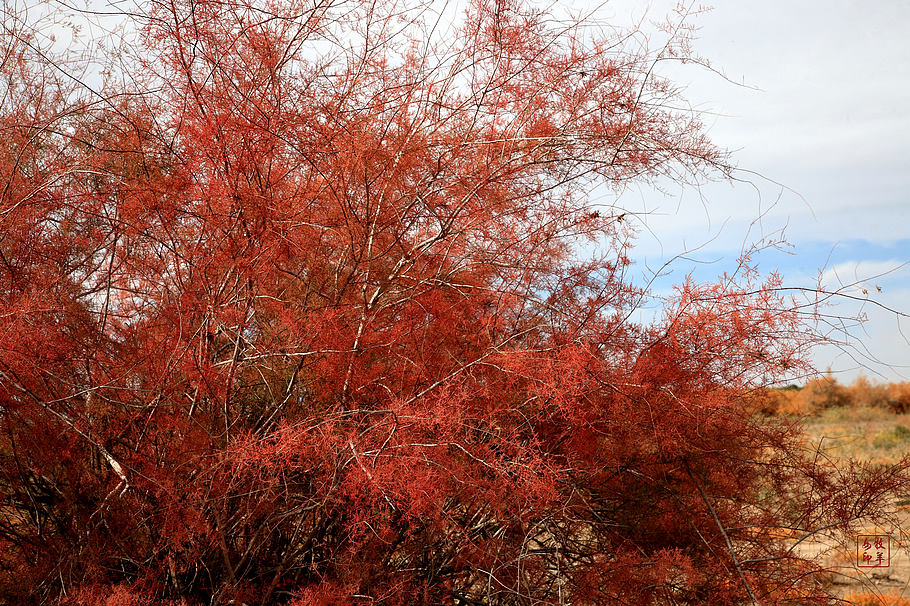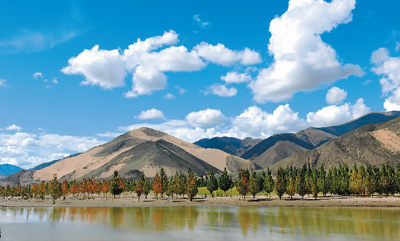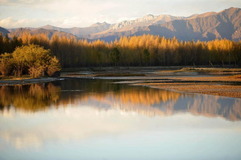Ngari of Tibet: Irrigation project gives way to rose willows

The Yasha irrigation project was started in June. As an important water conservancy project in the Ngari Prefecture of the Tibet Autonomous Region, it will irrigate thousands of acres of grassland and woodland in Gar County when put into operation.
Recently, the project ran into problems. When workers were digging a channel at the Yasha project construction site in the Gar river valley, they realized that if they stuck to the original design plan, they would destroy the rose willows three kilometers below the water intake. A forest of this scale with a 1500 natural trees will have been growing for at least 100 years.
How would the locals solve these problems and make choices?
Chop them down or not? This put Badro, one of the workers in a difficult situation. Changing the project would increase cost and delay the project. But, seeing this sight of beauty amongst desolation, he quietly decided, “It really isn’t easy to form a natural forest like this in Ngari. We must avoid any negative effects caused by destruction.”
On the day after discovering the problem Ngari’s party committee and administrative office convened relevant departments to discuss the matter.
After much research and argument, the design plan was altered – there would have to be a bend in the irrigation channel.
This was in line with Badro’s intentions: “If we stuck to the original plan we’d have to dig up 1500 rose willows. However, after adjustments to the channel not a single rose willow will be dug up.”
The Yasha irrigation project will provide irrigation to Gar County’s 20,000 acres of artificial forage and 7,000 acres of woodland, which the local farmers have been looking forward to for a while.
In the opinion of Liu Hong, deputy commissioner at Ngari Administrative Office, the water conservancy project is an ecological as well as economic project.
Although the project will be delayed and costs increased, the rose willows are maintained with great sand solidification effect, which is more important.
"As Tibet’s and Ngari’s ecological environment is relatively weak, though it is likely to increase a little investment into the Yasha project, it will be beneficial to ecological protection. Ecological protection is the bottom line,” said Liu Hong.
Your Comment
Name E-mailRelated News
-
;
-
-

-
Tibet’s Yarlung Zangbo River ecology demonstration area
Starting in 2014, the Tibet Autonomous Region commenced a greenification project for the “Two Rivers & Four Rivers” .
-
-
-

-
Long-term task to protect ecology on highest plateau
With an average altitude of about 4,000 meters, the Qinghai-Tibet Plateau in southwestern China is a unique geographical region.
-
-
-

-
Some Tibetan antelopes do not migrate due to improved ecology: off
Now is the birthing migration season for Tibetan antelope. But research has found that some Tibetan antelopes now choose to remain where they are for labor.
-
Based in Lhasa, Tibet Vista is a Tibet travel agency that specialized in Tibet permit, and Tibet tours for both private and group travelers at a local price!
•4 Days Lhasa City Group Tour from USD 460 •8 Days Everest Base Camp Group Tour from USD 850 •15 Days Mt.Kailash Group Tour from USD 1780 •2016 Tibet Train Tours from Beijing, Shanghai, Chengdu, Xining,etc










